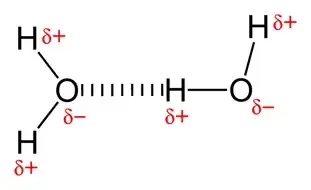No
Water forms strong intermolecular forces between its molecules. This is called hydrogen bonding and is a form of permanent dipole/permanent dipole interaction. Oxygen is more electronegative (its nucleus attracts a bigger share of the electron cloud of the covalent bond) than hydrogen. This causes water to form a permanent dipole where the oxygen has a small negative charge and the hydrogens have small positive charges.
 File:Hydrogen-bonding-in-water-2D.png
File:Hydrogen-bonding-in-water-2D.png
This causes electrostatic attraction between water molecules and they can form structures for a small amount of time. Other molecules in the water can affect these short lived structures and water does retain some 'memory' of these molecules.
This is how some proponents of homeopathy claim it works. This memory somehow has an opposite effect to the toxin or other chemical that was diluted, although there has not been any mechanism proposed for this.
However, the duration of the water memory has been scientifically tested and shown to be very short (less than one billionth of a second). This means that the memory has gone by the time the patient even takes the dose.
Even if water did have a long term memory, it would not prove homeopathy. There would also need to be evidence that this water memory had the medical effects that have been claimed.
